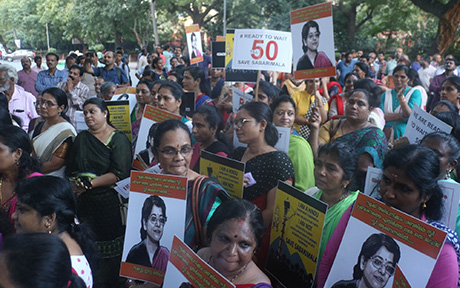The famous temple of Lord Ayappa is in controversy because of barred the entry of women from the 10 to 50 years. Supporter of North entry of women argue that this is a tradition which is continue since the long time and in other hand feminist claims that It is a violation of right to worship guaranteed under Article from 25 to 28 . In this Article I will analyse the right of women, and validity of Sabrimala temple tradition.
[breaking_news_ticker id=”1″ t_length=”35″ bnt_cat=”” post_type=”post” title=”Breaking News” show_posts=”5″ tbgcolor=”222222″ bgcolor=”333333″ bnt_speed=”500″ bnt_direction=”up” bnt_interval=”3000″ border_width=”0″ border_color=”222222″ border_style=”solid” border_radius=”0″ show_date=”show” date_color=”b23737″ controls_btn_bg=”dd3333″ bnt_buttons=”on”]
I am fully favour in the worship right of women, because Article 25 says that everyone has right to conscience, profession and practice and propagation of religion with subject to public order, morality, health and other fundamental right and Right to worship in a temple is a fundamental right of every individual.
[maxbutton id=”8″ text=”#SabarimalaVerdict” ]
No Entry of women between the age of 10 to 50 is a violation of Right to equality and equal protection of law ( Article 14), Article 15 (3) which says that No laws can be against the women and the term law means not only parliament made laws but also all laws enherined in Article 13 includes Rules, Regulation, Ordinance, Custom, and Usage, therefore the tradition of Sabrimala temple contrary to the Article 15 (3).
And It is a untochability with the specific age group of women while Article 17 talk about the Abolition of untouchability. And it is not only a violation of women’s fundamental rights but also it is a crime under the protection of civil rights Act 1955.
Disclosing the identity of menstruation women is a violation of right to privacy under the Article 21 of Indian Constitution and In Puttaswamy v. Union of India case supreme Court held that Right to Right to privacy is a fundamental right.
Read Also, #SabrimalaCase: Analysis of the Justice Indu Malhotra verdict
In Conclusion I want to says that Lord Ayappa is not a property of any organization and It is very shameful that in on hand Women are regarded as the symbol of goddess and another hand they can not worship because of his biological identity. And Prohibition of women is a form of untouchability. The sole basic of restriction is menstruation of women. To keep away menstruation women is a form of untochability which is a crime under the protection of Civil rights Act 1955.
[maxbutton id=”4″ ]
And it is not a valid justification that that tradition is very old they may be wrong like sati, child marriage and Right to worship in Temples are a fundamental rights of every individual. As a citizen of India I appeal to all person for support the entry of all age group women because Article 51A (e) says that it is a duty of the citizen to oppose the such tradition which affect the dignity of women.
Author- Rajesh Yadav.


